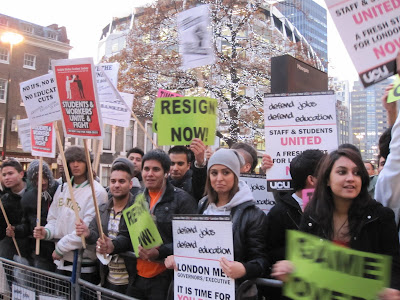
17th of December
Rebecca Attwood
Chief executive issued ultimatum to London Met governors before mass resignations: leave or risk the institution’s funding. Rebecca Attwood reports
Governors at London Metropolitan University were handed an ultimatum by funding chiefs who threatened to stop financing the institution if they did not resign, Times Higher Education has learnt.
In a joint statement released today, the university and the Higher Education Funding Council for England say that all board members who were in place in the period up to 31 August 2008 are to step down by 31 August 2010.
The action follows a letter from Sir Alan Langlands, Hefce’s chief executive, to Peter Anwyl, chair of the governors, on 14 December. It warns that Sir Alan would “press for urgent action” and review whether the university should continue to receive public funding if he was not assured that the board was responding “promptly and appropriately” to a series of reports detailing poor governance and management at London Met.
The letter, seen by Times Higher Education, calls for all board members who were part of the audit committee during the period to stand down “immediately”.
Yesterday, London Met’s University and College Union branch issued a statement to its members saying that at a governors’ meeting on 15 December, Mr Anwyl had resigned with effect from the end of March 2010, and that other governors associated with the audit committee would follow suit.
This is confirmed by today’s statement, which says the audit committee will be “renewed” by 1 April 2010.
The university has been embroiled in a row with the funding council after it emerged it had massively overclaimed public funding as a result of inaccurately reported student dropout rates.
Brian Roper, who was in charge when the flawed data returns were made, resigned as vice-chancellor in March, and the university is now being forced to hand back tens of millions of pounds, leaving hundreds of jobs at risk.
“The scale of the governance, management and operational failures at London Met is unprecedented in higher education in this country in recent years and urgent action needs to be taken,” Sir Alan’s letter says.
Sir Alan adds that he is “disappointed” that the board refused to consider the critical reports into the affair produced by Sir David Melville and Deloitte until 15 December.
He then warns that unless action is taken, he would “ultimately consider whether or not the university should continue to receive Hefce grant funding”.
Sir Alan stresses that Hefce’s main concerns are “the wellbeing of the students and the motivation of the staff”, and says that it is willing to consider a “realistic” bid for money from its Strategic Development Fund, although it has yet to receive such a proposal.
The letter also describes an issue excluded from the joint statement due to its “sensitivity”: “With regard to the senior managers criticised in the reports, I have already recommended that the board should take advice on whether or not the former vice-chancellor failed in his fiduciary duties and what prospect there is of recovering money for the public purse.”
Sally Hunt, UCU general secretary, called for the governors’ departure to be sped up.
“Those responsible must go immediately as their continued presence on the board does nothing to lend any credibility to the institution,” she said.
“We need one quick blow from a guillotine, not numerous hacks from a blunt axe.”







